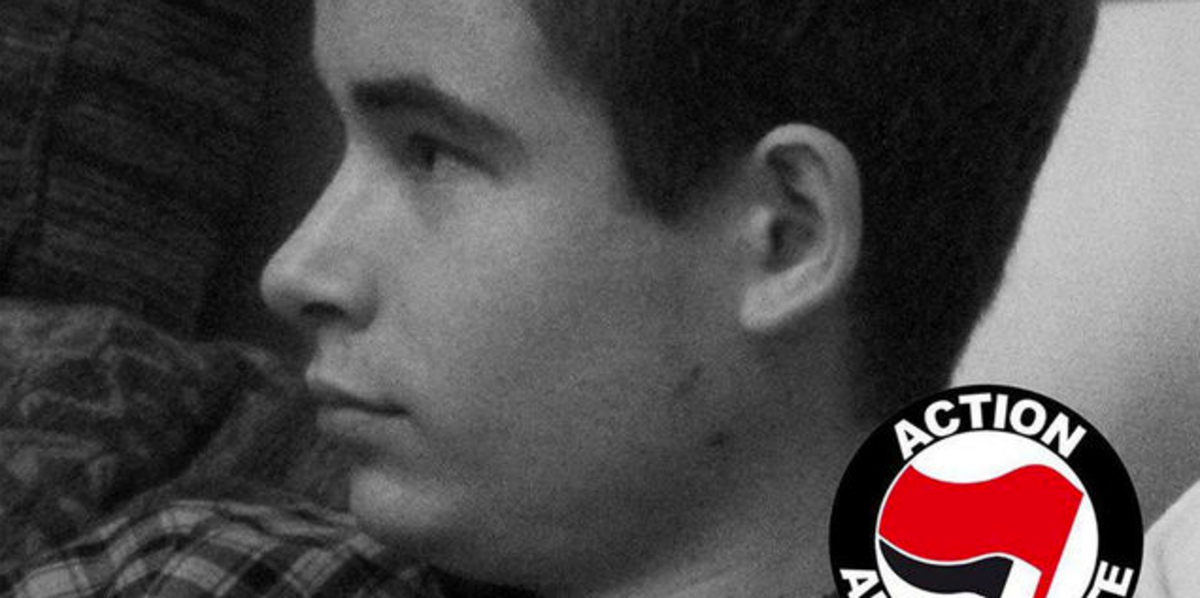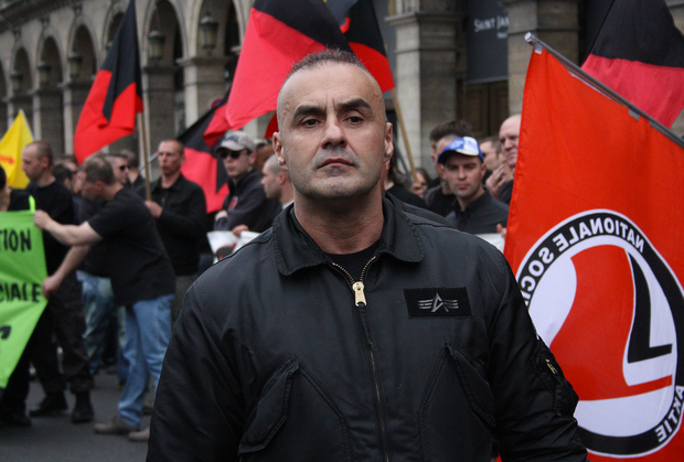The mainstream political parties in France have reacted in horror and outrage after a 19-year-old left-wing student activist was beaten to death by a group of skinhead thugs in the centre of Paris. Experts say it is the first such major violent attack carried out by extreme right-wingers since the 1980s. Some on the Left blamed the recent anti gay marriage protests for poisoning the political atmosphere in the country and paving the way for violence from the extreme right.
Clément Méric, a student at the prestigious Sciences Po university and a member of the anti-fascist Action antifasciste Paris-banlieue group, was attacked after he and three other activists visited a clothes shop in rue Caumartin in Paris's ninth arrondissement on Wednesday afternoon at around 5pm.

Enlargement : Illustration 1

According to witnesses Clément Méric and his friends were confronted by skinheads after they left the store. Having surrounded the left-wing activists the skinheads attacked, and Méric was hit with a knuckle duster, his head smashing against a metal pole. “I was 30 metres away with my friend and we heard a loud bang when his head hit the post,” said one witness on the 20Minutes news website.
One of Méric's friends, Mathieu, who was present said: “We hadn't expected such a confrontation but we couldn’t escape, literally we had our backs to the wall.” Quoted on the Libération website he continued: “Clément was hit in the face with a knuckle duster. We finally managed to escape them but it was too late – Clément was dead on the spot.”
The student was taken to La Pitié-Salpêtrière hospital in Paris and was later declared to be brain dead. His death was confirmed on Thursday afternoon.
Witnesses say that one of the skinheads, who wore bomber jackets and heavy-duty boots, had a swastika tattoo on his neck, while the dead student's friend said they also wore tee-shirts with the slogans 'White Power' and 'Blood and Honor'. Four people aged between 20 and 30, one a woman, were initially arrested by police on Thursday in connection with the attack, with three others being detained later in the day.
The violent assault in the middle of Paris immediately provoked anger among politicians and activist groups. Alexis Corbière, a councillor in Paris and national secretary of the radical left Parti de gauche led by Jean-Luc Mélenchon, declared a few hours after the assault: “The fascist horror has just killed in the middle of Paris.” He blamed the extreme-right group Jeune nationaliste révolutionnaire (JNR) for the attack. However that group's leader Serge Ayoub denied the accusation, and said that he had had the time to “inform” himself about the assault and claimed that it had been the left-wing activists who had thrown the first punches. He said the skinheads concerned “had the misfortune to have hair that's too short and a brand of tee-shirt that others don't like”.

Enlargement : Illustration 2

Police sources, meanwhile, told Le Parisien that those arrested in connection with the attack had links with the extreme right, with some said to be close to the JNR and an affiliated group 'Troisième Voie' or 'Third Way'. The government has since said it will close that group down.
Among mainstream parties there was unanimous condemnation of the killing. Interior minister Manuel Valls, who visited the scene of the assault, spoke of his “total determination to eradicate this violence that bears the hallmarks of the extreme right”. Speaking from Japan where he is on a state visit, President François Hollande described the attack as an “odious act” while Jean-François Copé, the president of the main right-wing opposition party the UMP, condemned what he called a “barbarous attack” and an “atrocious crime”.
Yet some on the Right also accused the Left of seeking to exploit the student's death. The UMP deputy administrator Valérie Debord, UMP MP and former education minister Luc Chatel and UMP MEP and former justice minister Rachida Dati attacked what they called an “attempt to politically hijack” the tragedy by the Left. “In these circumstances and outside all ethics certain [figures] such as [Socialist party national secretary] Harlem Désir, [senator for the green movement Europe Écologie-Les Verts] Jean Vincent Placé and other socialist elected representatives think they can point the finger at the UMP or make a parallel between the assailants and the families who protested peacefully in the street against the planned law on homosexual marriage,” said Debord.
The mood among friends, colleagues and sympathisers who gathered first outside Sciences Po and later near the spot where Clément Méric was attacked was sombre and at times angry. Some were quick to make a link between the attack and the mood of the country following the anti same-sex marriage protests. “It’s a disgusting political crime,” said Philippe, an activist in a teaching union. “It's just not on that the most extreme fringes of the extreme right believe they can do anything, that they parade in the street like they did with the law on marriage for everyone.” A pensioner said: “This terrible atmosphere has lasted for four months now.”
Like some others on the Left he singled out Frigide Barjot, the humorist turned activist who became a spokeswoman for the Manif pour tous - 'demonstration for everyone' - protests against the same-sex marriage laws. “It was Frigide Barjot who said, 'You want blood, you'll have it'. And here you are...” said the pensioner.
'Lack of leadership'
Barjot herself says she will take action for defamation against businessman Pierre Bergé, part owner of Le Monde and a prominent supporter of gay rights, for Bergé's Tweet about her on Thursday. In it he said: “The revolting Barjot had promised blood, here it is splattering democracy and the Republic. Is #manifpourtous aware?” Barjot said it was “improper” to “hijack” the issue in this way “without even showing compassion”. She insisted the violence in the attack in which Clément Méric died involved two extreme groups, one from the Left, one from the Right, and that the aggressors were not in the Manif Pour Tous protests which were made up of “families with pushchairs”.
The president of the far-right Front national (FN) Marine Le Pen found herself having to reject any link between her party and the attackers, and denying reports that one of the skinheads had been wearing a Front national tee-shirt. Le Pen said her party had “absolutely no connection” with the “unacceptable” and “appalling” attack. “If it is shown that these groups [such as the JNR] give instructions to carry out violence to their members, then, yes, [their dissolution] could be considered,” she said on RTL radio.
The anti-racist association the Mouvement contre le racisme et pour l'amitié entre les peuples (Mrap) called for extreme-right groups to be closed down. “This murder raises the question of the renewed outbreak of activity by extreme-right groups,” it said in a statement.
Interviewed by Mediapart, the historian Nicolas Lebourg, an expert on the extreme right, said of Wednesday's attack: “We haven't seen such an act since the years 1988-89. At the time racial attacks took place in Rouen [editor's note, in north-west France] and Brest [editor's note, in west France] implicating the JNR; a left-wing bookshop was attacked, the [extreme right Groupe Union Défense] GUD was implicated in a plot to kill at Lille-3 [university],” he said. “Each time they were racist crimes,” he added. This was not the case with the killing of Clement Méric.
Lebourg says that the extreme right groups were galvanised by the anti gay marriage street protests. “The object at the start was to reproduce the demonstrations of 1984 [editor's note, which saw protests against a proposed ban on religious schools]. The GUD was, moreover, revived as a result of those protests.”
However, the historian says that the current leaders of extreme right groups do not know how to control or direct their supporters. “Among the opponents [editor's note, of same-sex marriage] everyone knew that the loi Taubira [editor's note, the law's official name] would be passed. They needed an exit strategy,” says Nicolas Lebourg. “The unrest of the nebulous French Spring [movement] became a stage setting where there was lots of excitement but no perspective, absolutely no objective.”
The historian added: “These groups – particularly the JNR or Alexandre Gabriac's [radical right group] 'Jeunesses nationalistes' [editor's note, he was expelled from the FN in 2011 for giving a Nazi salute] – were not able to give their supporters staged, symbolic victories. Yet the job of those in charge is to create a surge and then bring the supporters down again by telling them 'well done, in achieving such and such an objective' or 'we've brought in new supporters'.” Lebourg says that only the far-right Bloc Identitaire (BI) has been able to handle its supporters in this way.
Another reason why far-right groups have become more radical, says Lebourg, is that under Marine Le Pen the FN has tried to move away from extreme groups and towards the centre. This has given the radical groups “breathing space” says the historian. He points out: “Unlike her father [former FN president Jean-Marie Le Pen], who had an influence on these groups, Marine Le Pen has absolutely no leadership over them, on the contrary she legitimises their freedom of action. People who would have been asked to calm down inside the FN are less constrained outside. Someone like Gabriac could not say a tenth of the things he does inside the FN.”
In the 1980s the Jeune nationaliste révolutionnaire (JNR) or 'Revolutionary Nationalist Youths', the group now in the process of being closed down, was the main outfit organising the activities of skinheads on the extreme right, and revolved around Serge Ayoub, mentioned earlier, whose nickname is 'Batskin'. After several years of absence in the 1990s, Ayoub reappeared in the mid 2000s alongside the 'Égalité et réconciliation' or 'Equality and reconciliation' movement – which claims allegiance to values from both the Right and Left - created by Alain Soral, who was then also a member of the Front national's central committee. “The Alain Soral line then the more 'social' approach of Marine Le Pen [editor's note, which really began in 2011] was started by Serge Ayoub,” says Nicolas Lebourg. “He has adopted a revolutionary nationalist stance that is anti the system and about defending the underdog.”
Ayoub and Soral created a community bar, Le Local, before Ayoub went on to relaunch the groups the JNR and the broader movement known as the 'Troisième Voie' or 'Third Way'. Lebourg says: “Until now the JNR has limited itself to acts of provocation, symbolic acts. For example, Ayoub got them to march in brown shirts [editor's note, a symbol of Nazi Germany] in Paris. Now we are seeing a radicalisation.”
In recent weeks there have been homophobic attacks, the barracking of UMP president Jean-François Copé during an anti same-sex rally and the unfurling of a banner at the HQ of the Socialist Party urging President Hollande to resign. In April the attack on a gay bar in the northern city of Lille had already been linked with members of the JNR and the Troisième voie.
To see photographs of the gathering that took place in Paris on Thursday evening to remember Clément Méric click here.
--------------------------
English version by Michael Streeter


